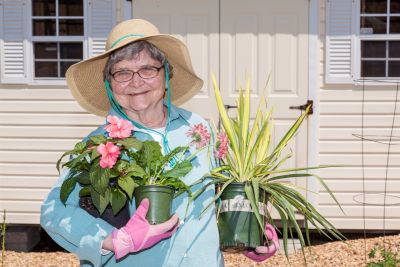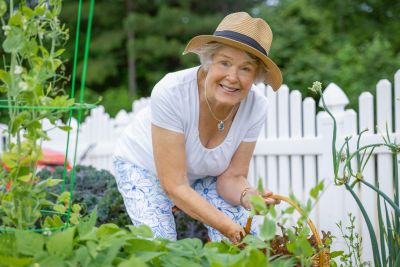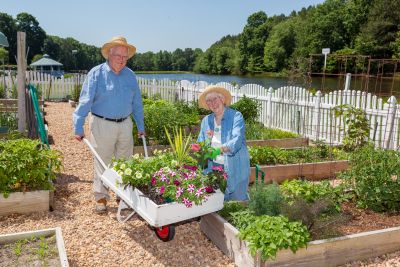Gardening is a great hobby for people who like to stay active, get plenty of fresh air, and accomplish something useful in their free time. It also offers a surprising array of health benefits, all of which can have a significant impact on the quality-of-life seniors can enjoy during their retirement years. Here are some of the health benefits of gardening for seniors you may not know about:
 Physical Benefits of Gardening
Physical Benefits of Gardening
Gardening regularly provides moderate-to-intense exercise that builds strength in the arms, legs, and back as well as smaller stabilizing muscles. The best part? If you’re focused on what you want to accomplish, you might not even notice that you’re working out. Getting regular exercise is beneficial for seniors because it:
- Lowers blood pressure
- Reduces the risk of heart disease, stroke, obesity, and osteoporosis
- Improves the quality of sleep
- Increases dexterity and balance, both of which are helpful for preventing and recovering from falls
- Boosts strength and mobility in seniors, which helps them live independently for longer
In addition to all of these essential physical health benefits, gardening provides exposure to the sun, which helps the body produce vitamin D. Adequate vitamin D production helps to:
- Boost immune system function
- Increase calcium absorption for stronger bones
- Prevent fatigue and joint pain
- Reduce the risk of developing diabetes as well as certain cancers
 Mental Benefits of Gardening
Mental Benefits of Gardening
It may surprise you to learn that there are many mental health benefits of gardening as well. Gardening is excellent for both your psychological well-being and overall brain function, and it can even help to prevent specific cognitive and mental health disorders. Getting one’s hands a little dirty can help seniors to:
- Relieve stress
- Increase production of dopamine and serotonin, which help to regulate mood and support overall happiness
- Decrease the risk of dementia by engaging the mind; gardening can even help seniors who do have dementia by stimulating the senses and keeping them in the present moment
- Benefit from an excellent form of “memory care” for seniors with Alzheimer’s disease and other conditions that affect memory
- Alleviate and reduce the risk of depression
- Prevent boredom and gain a sense of accomplishment
- Encourage continued learning about various plants and their needs, which can also build skills, engage the mind, and boost self-esteem
 Benefits of Community Gardens
Benefits of Community Gardens
You can enjoy all of these benefits by gardening alone at home. However, you stand to gain still more by working in a community garden in your neighborhood or retirement community.
Provide Free or Reduced-Cost Flowers and Produce
Growing your own flowers, herbs, fruits, or veggies means you get to enjoy their beauty and get fresh food for far less than you’d pay at the grocery store. Yet contributing to a community garden also gives you an opportunity to share or trade produce items with other residents. Instead of only “reaping what you sow” individually, you’ll have a chance to try a tasty and intriguing variety of foods.
Promote Healthier Eating
Everyone knows that fruits and vegetables from the garden taste infinitely better than what you can buy at the grocery store, which means your community garden can easily entice you to incorporate a greater variety of produce and leafy greens into your diet. As a result, you’ll be taking in vitamins, minerals, antioxidants, and fiber, all of which will help to keep you looking and feeling your best. Plus, because a healthy diet can prevent a long list of chronic diseases, eating garden foods can help you spend less time at the doctor’s office and more time enjoying life!
Offer Opportunities To Socialize
Making new friends is all about sharing experiences and finding common interests, no matter what age you are. Participating in a community garden means you’re likely to bump into other gardeners, and it will be easy to strike up conversations as you work together, share tools, and admire each other’s progress (and produce). You can learn a lot from other gardeners as well, which can be helpful for branching out and trying to grow new things.
Improve the Quality of Your Micro-Environment
Community gardens also support the health and beauty of your local environment, whether you live in a city, the suburbs, or a rural area. They do this by:
- Improving soil and air quality
- Reducing the amount of carbon emissions created by driving or riding to the grocery store
- Improving water filtration
- Creating a more attractive and peaceful space you’ll enjoy spending time in
- Increasing the biodiversity of your environment by attracting insects that can help to spread pollen and seeds beyond the garden and provide food to birds and other small animals; some insects are also simply pretty to look at, such as ladybugs, moths, and butterflies
Show Off Your Green Thumb at Rappahannock Westminster-Canterbury
Rappahannock Westminster-Canterbury is a continuing care community (also known as a life plan community) providing the highest quality living experience for discerning senior adults. Situated on 165 beautiful acres outside the village of Irvington in Virginia’s Northern Neck, RWC residents choose to live here for the independent and worry-free lifestyle afforded in a tranquil setting.
We offer options for working in your own private garden or our community garden, which boasts 26 raised beds and beautiful crushed stone walkways meticulously maintained by our landscaping crew. Our community shed provides all the tools you’ll need. We also have our very own Monarch butterfly sanctuary.
At RWC, you’re only a ten-minute drive from the Chesapeake Bay or the Rappahannock River as well as a variety of creeks, estuaries, and other rivers. You’ll have access to all that our local freshwater and saltwater destinations have to offer, from outdoor recreation to dining on fresh local catches to boutique shopping.
Rappahannock Westminster-Canterbury Inc. is a Virginia nonprofit corporation affiliated with the Episcopal and Presbyterian churches. All religions are welcome. Read about our residence options and living our lifestyle!
